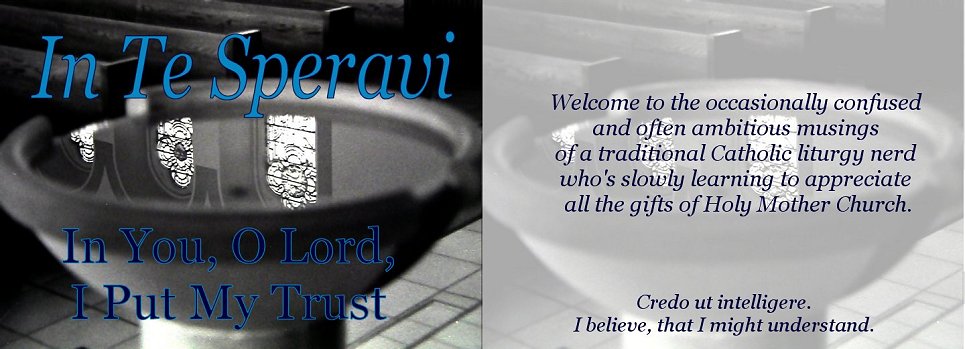A few of us gather in the chapel of my building to chant Compline on weeknights, occasionally followed by a conversation (or a walking rosary). One such evening a few weeks ago, it came to light that Kyle and I had both been at the same local EF parish at the same time, without either of us having realized it.
Now, Kyle and I have chatted liturgy before, so all our cards were out on the table before the conversation began: He prefers the OF, I prefer the EF, and we're both perfectly fine with the other liturgy (it's just not our preference). The more we chat, the more I am impressed by the fact that, despite his lack of personal attachment to the EF, he is willing again and again to return to it, to try and learn it, to try and love it, simply because it's a part of our Catholic tradition.
The chat was pleasant enough, as always, and toward its end, Kyle made a remark that he surely forgot immediately, but that stayed with me: "I'd rather a good novus ordo any day."
I had neither profound insight nor witty retort ready at the moment, so I left it be, bade goodnight, and went back to my room.
But as I was reflecting upon this conversation later that evening, I found myself concluding that what Kyle prescribes here is very possibly what the Church most needs. You all know that I love the Extraordinary Form of the Mass, and it is truly beautiful to see the EF being celebrated in more and more places the world over, and thus unlocking the treasury that had been all but forgotten in the turmoil of recent decades. Yet in how many places is the EF celebrated in complete isolation from the OF, thus providing a refuge for some without sharing its grandeur with the many? Or how many times is the EF celebrated without adequate catechesis, resulting in brief nostalgia, or curiosity followed by an unchanged return to prior practice?
I know Summorum Pontificum has only been in effect for two and a half years, and that's no time, in the grand scheme of things. I know that it's too early to effectively judge what effect its celebration, even in isolation from good liturgical catechesis, will have in the Church at large. But at least the EF is being celebrated well. I daresay it's easier to find a good EF, no matter where you live (at least here in the States), than to find a good OF.
How many Catholics go to Mass and suffer through hokey liturgies with unlikeable music just because they're supposed to go to Mass on Sundays? There are myriad people with no particular interest in tradition or Latin or even good liturgy, who are just fulfilling their duty. These people are not going to go out of their way for Mass. But how much more would these same people be fed if their regular Sunday liturgy connected them with the past, sustained their spirits, and taught them how to worship God?
I learned recently that every Catholic has a canonical right to the liturgy celebrated correctly. A right! Canon Law is not particularly concerned with rights (especially when compared to American civil law), so this is a big deal. Not just a right to the sacraments, but to them celebrated according to the appropriate liturgical books.
Imagine: Walking down the street to Mass at the local parish of wherever you're visiting, secure in the knowledge that that there you'll find "a good novus ordo" - that you won't have to block out all sorts of strange liturgical adaptations in order to pray. What a world! Perhaps one of the most direct ways to accomplish this would be for people to just start doing it.
I know I'm dreaming, but maybe... Maybe if "a good novus ordo" were an everyday reality, then the gulf that currently exists between the OF and the EF might shrink, and liturgical politics really might not matter all that much. Maybe then we'd be freed from what Mosebach calls the "monstrous act" of evaluating liturgy, and would be able to walk into a church and simply pray.
What a world to hope for. What a world to work towards. It might not be my personal preference, Kyle, but I think I, too, might rather a good novus ordo.
PS - The nerd in me is so proud that more than two thirds of you do not use Internet Explorer to access my website. It's the little joys... :)
Karl and the Cloister
1 day ago

